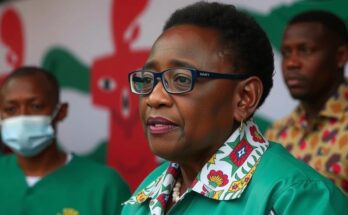Yamandu Orsi, representing the Broad Front party, has won the presidential runoff in Uruguay, defeating conservative candidate Alvaro Delgado. With 49.77% of the vote, Orsi’s victory indicates a shift away from the current ruling coalition. Both Delgado and President Lacalle Pou acknowledged the results and offered transition assistance, while the election reflects global trends of incumbent parties losing ground. The political atmosphere in Uruguay remains relatively moderate amid pressing economic concerns.
In a decisive victory, Yamandu Orsi, the centre-left candidate from the Broad Front party, secured the presidency of Uruguay, with 97% of votes tallied. Orsi garnered 49.77% of the votes, surpassing his conservative opponent, Alvaro Delgado, who received 45.94%. Upon addressing supporters in Montevideo, Orsi expressed optimism for the future of the nation, emphasizing themes of freedom, equality, and fraternity. Both Delgado and current President Luis Lacalle Pou promptly conceded, acknowledging Orsi’s win and offering to assist with the transition process.
The outcome of this election reflects a noteworthy change in Uruguay’s political landscape, marking a shift away from the conservative coalition that has governed the country. Orsi’s victory is part of a wider trend seen throughout the globe, where incumbent parties face increasing challenges. Despite high living costs and concerns surrounding crime, the country has experienced economic improvement, and Orsi has signaled intentions to maintain a moderate governance approach to reassure voters.
Uruguay, a nation of 3.4 million known for its stability and progressive policies such as legalized marijuana, has avoided harsh political divisions unlike its regional counterparts. This political climate has allowed for cooperative dialogue between rival parties, as evidenced by the goodwill expressed by both Orsi and his opponents. With the Broad Front gaining a notable presence in the Senate, winning 16 out of the 30 seats, Orsi is positioned to lead effectively, focusing on addressing the economic and social challenges the nation faces.
The recent presidential election in Uruguay has culminated in a significant shift in leadership, with Yamandu Orsi of the Broad Front party ousting the incumbent conservative coalition. This election is part of a broader trend seen in various countries, where voters are increasingly favoring change over continuity in response to local and global challenges. Set against the backdrop of rising living costs and crime, the election reflects the dynamics of a small yet politically stable nation navigating evolving societal needs.
In conclusion, Yamandu Orsi’s victory marks a pivotal moment in Uruguay’s political history as the nation transitions away from conservative governance. His promise of a ‘modern left’ approach aims to tackle critical issues such as inequality and crime while fostering a collaborative political environment. With a supportive Senate majority, Orsi will be positioned to implement his policies effectively, reflecting broader electoral trends across the region and the world.
Original Source: www.theguardian.com




